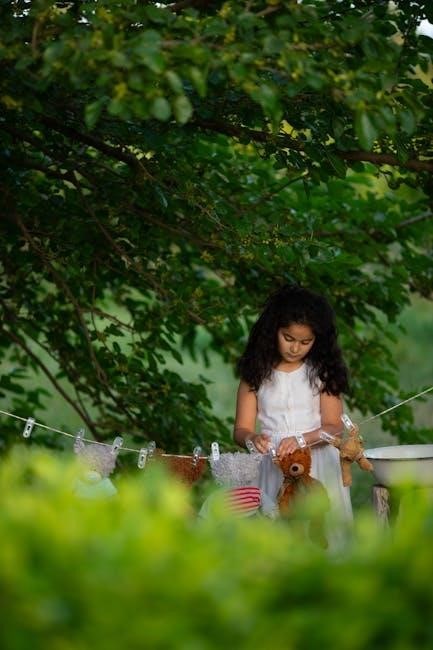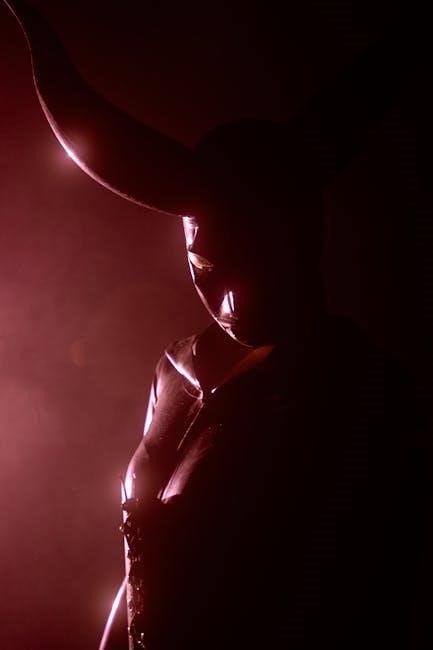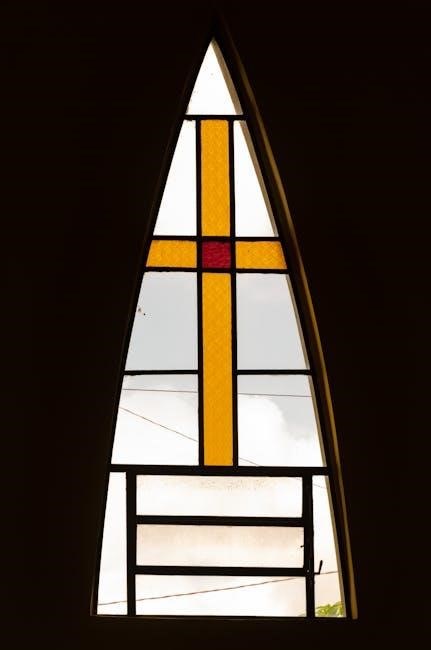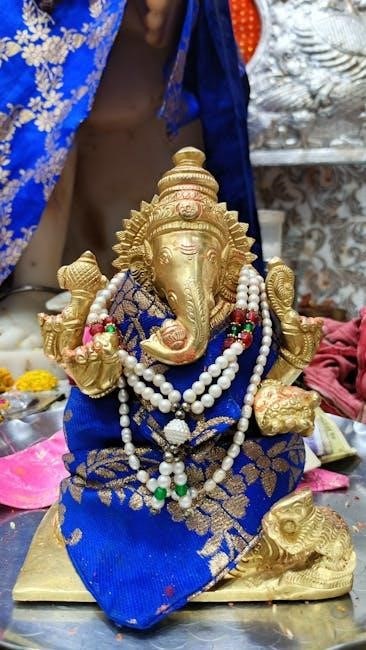god of carnage play pdf

God of Carnage, a dark comedy by Yasmina Reza, explores civility’s collapse when two couples meet to discuss their children’s altercation, revealing their true selves․ The PDF script is widely popular for its sharp wit and commentary on social class, making it a staple in theatre studies and discussions․
1․1 Overview of the Play
God of Carnage, a dark comedy by Yasmina Reza, delves into the breakdown of civility among two couples meeting to discuss their children’s altercation․ The play unfolds in the Novaks’ living room, where polite conversation devolves into chaos, exposing underlying tensions and societal hypocrisies․ Through sharp dialogue and satire, Reza critiques bourgeois norms, revealing how adults regress to childish behavior․ The play’s intensity and psychological depth have made it a modern theatre classic, available as a PDF for widespread access, fostering discussions on human nature and societal expectations․
1․2 Historical Context and Background
God of Carnage, written by Yasmina Reza in 2007, reflects postmodern societal tensions, critiquing middle-class values and parenting․ The play, originally in French, gained global acclaim for its universal themes․ Its translation into multiple languages, including English by Christopher Hampton, facilitated its worldwide success․ The play’s premise—a meeting between parents to discuss their children’s fight—mirrors contemporary issues of societal expectations and human behavior․ The PDF version of the script has become a popular resource for theatre enthusiasts and scholars, highlighting its relevance in understanding modern human interactions and the masks people wear in civilized settings․
1․3 Relevance of the Play in Modern Theatre
God of Carnage remains a significant work in modern theatre due to its timeless exploration of human behavior and societal norms․ Its darkly comedic style resonates with contemporary audiences, offering a mirror to the hypocrisies of modern parenting and social interactions․ The play’s universal themes, such as the breakdown of civility and the mask of politeness, continue to spark dialogue․ Its availability in PDF format has made it easily accessible for study and performance, ensuring its influence on both academic and theatrical circles․ The play’s relevance lies in its ability to challenge and entertain, making it a cornerstone of 21st-century theatre․
The Author: Yasmina Reza
Yasmina Reza, a French playwright, captivates audiences with her sharp wit and exploration of human behavior, as seen in “God of Carnage,” a play that masterfully blends humor and depth․
2․1 Biography of Yasmina Reza
Yasmina Reza, born in 1959 in Paris to Iranian and Russian-Jewish parents, is a renowned French playwright, novelist, and actress; Her diverse background influences her work, which often explores themes of class and social dynamics․ Reza’s writing career began in the 1980s, and she gained acclaim with plays like “Art” and “God of Carnage,” both of which have been translated into multiple languages and adapted into films․ Her sharp wit and ability to dissect human behavior have made her a significant figure in contemporary theatre, earning her numerous awards and international recognition․
2․2 Her Writing Style and Themes
Yasmina Reza’s writing style is characterized by sharp wit, biting dialogue, and a keen observation of human behavior․ Her plays often explore themes of social class, hypocrisy, and the fragility of civility․ With a darkly comedic tone, Reza dismantles the facade of polite society, revealing the raw emotions and primal instincts beneath․ Her work frequently critiques bourgeois values, highlighting the tension between outward refinement and inner chaos․ Through concise, impactful language, she creates scenarios that are both relatable and unsettling, forcing audiences to confront uncomfortable truths about themselves and the world around them․ This blend of insight and humor has made her a master of contemporary theatre․
Plot Summary
Two couples meet to discuss their children’s altercation, starting with civility but escalating into chaos, revealing primal behavior beneath their polished exteriors․ The PDF script highlights this darkly comedic descent․
3;1 The Setting of the Play
The play is set in a bourgeois living room in Paris, belonging to the Novak family․ The refined furniture and elegant decor reflect their social status․ The realist setting emphasizes the contrast between the characters’ civilized facade and their true nature as tensions rise․ The confined space heightens the claustrophobic atmosphere, forcing the characters to confront their primal instincts․ The setting plays a crucial role in highlighting the themes of social class and the unraveling of civility, as the characters’ behavior deteriorates amidst the polished surroundings․
3․2 The Incident Involving the Children
The play begins with an altercation between two 11-year-old boys, Bruno and Ferdinand․ Bruno loses two teeth when Ferdinand hits him with a stick, leading their parents to meet; This incident triggers a series of events that expose the adults’ true selves․ The children’s conflict serves as a catalyst for the unraveling of the parents’ civility, revealing their own immaturity and hypocrisy․ The incident is simple but significant, setting the stage for the darkly comedic exploration of human nature and societal norms․ It highlights how seemingly minor events can escalate into chaos, mirroring the broader themes of the play․
3․3 The Meeting of the Parents
The meeting between the Novaks and the Raleighs begins with forced politeness, as they gather to discuss their sons’ altercation․ The parents attempt to maintain a veneer of civility, but tensions simmer beneath the surface․ The conversation starts with seemingly rational dialogue, but it quickly devolves into personal attacks and revelations of their true selves; The meeting is fraught with underlying competitiveness and social class differences, which gradually escalate as the discussion progresses․ This encounter serves as a catalyst for the unraveling of their facades, exposing their hypocrisy and immaturity․ The PDF script captures the intensity of this meeting, highlighting the dark humor and societal critique central to the play․
3․4 The Escalation of Tensions
The meeting’s initial civility quickly erodes as underlying tensions surface․ The parents’ polite facade crumbles, revealing their true selves․ Competing egos, social class differences, and suppressed anger fuel the escalating conflict․ The conversation turns confrontational, with personal insults and accusations flying․ The atmosphere shifts from calm to chaotic, exposing the characters’ hypocrisy and immaturity․ The escalation highlights the breakdown of communication and the raw emotions beneath their civilized masks․ This intense progression is vividly captured in the PDF script, showcasing the dark humor and societal critique that define the play․ The tension builds relentlessly, leading to a climactic unraveling of their composure․
Themes and Symbolism
God of Carnage explores the breakdown of civility, revealing the raw emotions beneath polite facades․ The play critiques societal norms, using the chaos as a metaphor for inherent human conflict․
4․1 The Unraveling of Civility
Yasmina Reza’s God of Carnage masterfully examines how civility crumbles when societal expectations are challenged, exposing the raw emotions beneath polite facades․ Through the clash of two couples, the play reveals how seemingly civilized individuals descend into chaos, shedding their refined demeanor․ The PDF script highlights this unraveling, showcasing the tension between maintaining social norms and the instinctive human reactions that surface․ As the characters’ true selves emerge, the play critiques the superficiality of modern interactions, emphasizing the fragility of civility in the face of conflict and personal agendas․ This theme resonates strongly in both stage productions and the film adaptation by Roman Polanski, making it a central focus of analysis in academic papers and theatre studies․
4․2 The Role of Social Class
The play delves into the nuances of social class, portraying two couples from different backgrounds navigating a fraught situation․ The Novaks, embodying working-class values, clash with the Raleighs, who represent bourgeois sophistication․ Their interactions reveal underlying class tensions, as their differing priorities and manners clash․ The setting, a bourgeois living room, amplifies these dynamics, highlighting the societal expectations tied to class․ Reza critiques the pretensions of upper-class civility, showing how it crumbles under pressure․ This exploration of class is central to the play’s PDF script, making it a rich subject for analysis in theatre studies and academic discussions on social stratification․
4․3 The Concept of “Carnage” as a Metaphor
The term “Carnage” serves as a potent metaphor for the chaotic unraveling of civility and the latent violence beneath polished social surfaces․ The play uses it to symbolize not just physical conflict but the emotional and psychological turmoil that erupts when adults shed their civilized facades․ The PDF script reveals how the characters’ interactions descend into verbal sparring and petty cruelties, mirroring the primal ferocity of their children’s altercation․ This metaphor underscores Reza’s exploration of humanity’s duality, where refined manners mask raw, primal instincts․ The carnage becomes a mirror, reflecting the societal hypocrisy and the fragility of civilized behavior in the face of conflict․

Script and PDF Availability
The God of Carnage script and PDF are widely available online, accessible on platforms like Scribd for download or reading, in formats including PDF and text files․
5․1 Where to Find the PDF Version
The PDF version of God of Carnage can be easily found on various online platforms․ Websites like Scribd and Google Books offer the script for free download or online reading; Additionally, platforms such as Internet Archive and PDF Drive host the play in PDF format, making it accessible to a global audience․ Many academic and theatre-focused forums also provide direct links to download the PDF․ This widespread availability ensures that theatre enthusiasts and students can readily access the play for study or performance purposes, contributing to its enduring popularity in modern theatre․
5․2 Popularity of the Script Online
The PDF version of God of Carnage is highly sought after online, with numerous platforms offering free downloads․ Its popularity stems from its dark humor and relatable themes, making it a favorite among theatre enthusiasts․ The script is widely shared on forums, academic websites, and social media, with many praising its sharp dialogue and social commentary․ Its availability in multiple formats, including PDF, has further boosted its accessibility․ The play’s relevance to modern societal issues ensures its continued popularity, making it a frequently downloaded and discussed script in theatrical circles and beyond․

Adaptations and Interpretations
The play has been adapted into a film by Roman Polanski, titled Carnage, and has seen various stage interpretations worldwide, each offering unique perspectives on its themes․
6․1 The Film Adaptation by Roman Polanski
Roman Polanski’s film adaptation, titled Carnage, brings Yasmina Reza’s play to the screen with a star-studded cast, including Kate Winslet, Jodie Foster, Christoph Waltz, and John C․ Reilly․ The movie follows two couples meeting to discuss their sons’ violent altercation, mirroring the play’s darkly comedic tone․ Polanski’s direction amplifies the tension, capturing the characters’ descent from civility to chaos․ Released in 2011, the film received critical acclaim, with Academy Award buzz surrounding the performances․ It remains a powerful interpretation of Reza’s work, offering a cinematic lens to the play’s exploration of human nature and societal norms, while the PDF script continues to be a popular resource for theatre enthusiasts․
6․2 Stage Productions Around the World
God of Carnage has been widely produced globally, with its premiere in Paris directed by Matthew Warchus․ The Broadway production opened in 2009, earning a Tony Award for Best Play․ In London’s West End, it ran successfully at the Gielgud Theatre․ The play has also been staged in Lebanon, marking its Arabic debut, and in numerous other countries, showcasing its universal appeal․ Each production maintains Reza’s sharp dialogue and dark humor, drawing audiences into the chaotic meeting of the Novaks and Raleighs․ The PDF script’s accessibility has further fueled its popularity, allowing theatre groups worldwide to bring this gripping comedy to life, highlighting its enduring relevance in contemporary theatre․

Performance History
God of Carnage premiered in Paris and later opened on Broadway in 2009, directed by Matthew Warchus․ The play has been staged globally, including in London’s West End, Lebanon, and other countries, showcasing its universal appeal and sharp dialogue․
7․1 Premiere and Initial Reception
The play premiered in Paris in 2007, receiving critical acclaim for its biting humor and insightful portrayal of human behavior․ Audiences were struck by its darkly comedic exploration of societal norms and the unraveling of civility․ The initial reception highlighted Yasmina Reza’s sharp dialogue and the play’s ability to resonate universally, making it a standout production in contemporary theatre․ Its success in Paris set the stage for its eventual international acclaim, including Broadway and West End productions, solidifying its place as a modern classic in the world of theatre․
7․2 Broadway Production
God of Carnage opened on Broadway in 2009 at the Bernard B․ Jacobs Theatre, directed by Matthew Warchus․ The production starred Jeff Daniels, Hope Davis, James Gandolfini, and Marcia Gay Harden, receiving widespread critical acclaim․ The play’s sharp dialogue and dark humor resonated with American audiences, further cementing its reputation as a contemporary classic․ The Broadway run was a commercial success, contributing to the play’s growing popularity and its availability in PDF format for theatre enthusiasts worldwide․ This production solidified Yasmina Reza’s work as a significant force in modern theatre, attracting diverse audiences and sparking discussions about its themes and relevance․
7․3 West End Production
The West End production of God of Carnage opened at London’s Gielgud Theatre, where it received critical acclaim for its biting wit and stellar performances․ Directed by Matthew Warchus, the play featured a talented cast, including Ralph Fiennes and Tamsin Greig, whose portrayals of the unraveling characters were praised․ The production’s success was evident in its sold-out shows and positive reviews, further establishing the play’s global appeal․ The West End run showcased the universality of Reza’s themes, resonating with British audiences and reinforcing the play’s relevance in contemporary theatre․ Its popularity also led to increased interest in the PDF script among theatre enthusiasts․
7․4 International Performances
God of Carnage has been performed globally, captivating audiences in diverse cultures․ The play premiered in France, then spread to countries like Lebanon, where it was first translated into Arabic․ Its universal themes resonated strongly, making it a hit in nations such as the U․S․, Italy, and the UK․ Performances in Lebanon marked a significant milestone, showcasing the play’s adaptability․ The play’s success in international markets highlights its ability to transcend cultural boundaries, with its sharp dialogue and relatable conflicts appealing to a worldwide audience․ This global acclaim has further boosted the popularity of the PDF script, making it a sought-after resource for theatre enthusiasts worldwide․
Cast and Characters
The play features two couples, the Novaks and the Raleighs, portrayed by notable actors like Edward Kassar and Rachel Feldman, whose performances bring depth to the complex characters․
8․1 Major Actors in Notable Productions
Notable productions of God of Carnage have featured standout performances from actors like Edward Kassar and Rachel Feldman, who bring depth to the complex characters․ Marisa Tomei and Christoph Waltz also starred in the film adaptation, showcasing their ability to portray the raw emotions of the roles․ The Broadway and West End productions highlighted the talents of acclaimed actors, further elevating the play’s dark humor and intensity․ These performances have been praised for their nuance, capturing the essence of the characters’ unraveling civility and societal pretenses, making the play a compelling watch for audiences worldwide․
8․2 Character Analysis: The Novaks and the Raleighs
The Novaks and Raleighs, two seemingly civilized couples, are central to the play’s exploration of societal norms․ The Novaks, with their bourgeois home, initially appear more grounded, while the Raleighs embody polished refinement․ However, as tensions rise, their facades crumble, revealing raw emotions and primal instincts․ Their interactions expose the hypocrisy and savagery beneath their polished exteriors, illustrating how quickly civility can unravel․ Through their dialogue and actions, Reza masterfully portrays the thin line between civilized behavior and primal instincts, making the couples relatable yet flawed, as they grapple with their own true nature and societal expectations․

Awards and Nominations
God of Carnage won the Tony Award for Best Play, showcasing its acclaim․ The play’s dark humor and social commentary earned widespread recognition, solidifying its theatrical impact globally․
9․1 Tony Award for Best Play
God of Carnage won the Tony Award for Best Play in 2009, a testament to its sharp dialogue and nuanced exploration of human behavior․ The award highlighted Yasmina Reza’s ability to blend humor with profound social commentary, resonating with audiences and critics alike․ This recognition not only elevated the play’s status but also solidified its place in contemporary theatre․ The Tony Award underscored the play’s universal appeal, making it a landmark production in modern drama․ Its success continues to inspire adaptations and discussions, ensuring its enduring relevance in the world of theatre and beyond․

9․2 Other Notable Recognitions
Beyond the Tony Award, God of Carnage received widespread acclaim and numerous nominations․ Its London production earned Olivier Award nominations, while the film adaptation, Carnage, directed by Roman Polanski, premiered at Cannes․ The play’s sharp wit and unflinching honesty resonated globally, making it a favorite in academic circles and theatre studies․ Its exploration of human nature and societal norms continues to inspire scholarly analysis and stage productions worldwide․ The play’s enduring popularity is evident in its availability as a PDF, allowing readers to engage with its themes and dialogue in various formats, ensuring its lasting impact on modern theatre․
Cultural Impact
God of Carnage has left a lasting mark on contemporary theatre, sparking global conversations about civility and societal norms․ Its sharp commentary continues to resonate, inspiring adaptations and discussions across cultures, solidifying its influence as a modern classic․
10․1 Influence on Contemporary Theatre
God of Carnage has significantly influenced contemporary theatre with its bold exploration of human behavior and societal norms․ The play’s dark humor and insightful dialogue have set a new standard for comedy-dramas, encouraging playwrights to tackle raw, uncomfortable truths․ Its international success has led to numerous adaptations, including films and stage productions, making it a benchmark for modern storytelling․ The play’s ability to resonate universally has ensured its relevance, inspiring a new wave of theatre that blends wit with profound social commentary, continuing to captivate audiences and influence creative works globally․
10․2 Discussions in Social Media and Forums
God of Carnage has sparked lively discussions across social media and forums, with users praising its sharp wit and relatable themes․ The play’s exploration of civility and social class resonates widely, making it a popular topic for debate․ Online communities often highlight its universal appeal, despite its Parisian setting, and discuss how its dark humor reflects real-life interactions․ The availability of the PDF script has further fueled conversations, as readers analyze its structure and dialogue․ Fans also share insights into its cultural adaptations, such as the Arabic translation and Roman Polanski’s film adaptation, showcasing its global influence and enduring relevance in modern theatre․

Educational Significance
God of Carnage is widely studied in theatre programs, offering insights into human behavior, dialogue, and societal norms․ Its PDF script is a valuable resource for academic analysis․
11․1 Use in Theatre Studies
God of Carnage is frequently incorporated into theatre curricula for its rich dialogue, complex characters, and exploration of societal themes․ The play’s PDF version is widely used in universities and drama schools to teach students about dramatic structure, character development, and the nuances of comedic timing․ Its single-act format and minimal set requirements make it an ideal choice for scene study and performance workshops․ Theatre students analyze its themes of civility, social class, and human behavior, while educators use it to demonstrate how dialogue can reveal character motivations and societal critiques․ The play’s accessibility in PDF format enhances its educational value, allowing students to easily annotate and reference specific scenes during analysis․
11․2 Analysis in Academic Papers
The PDF version of God of Carnage has become a focal point for academic analysis, particularly in exploring themes like civility, social class, and human behavior․ Scholars often examine how Reza uses dark comedy to critique bourgeois values, while the play’s single-setting structure allows for deep analysis of character dynamics․ Researchers also study the psychological undertones of the characters’ interactions, tracing themes of latent violence and societal hypocrisy․ The play’s accessibility in PDF format has facilitated its inclusion in numerous academic papers, where it is frequently cited for its sharp dialogue and unflinching portrayal of human nature․ This makes it a valuable resource for literary and theatrical analysis․
God of Carnage remains a gripping dark comedy that exposes human nature’s frailties․ Its enduring appeal in PDF format ensures accessibility, making it a timeless piece for theatre enthusiasts and scholars alike․
12․1 Final Thoughts on the Play’s Significance
God of Carnage masterfully exposes the fragility of human civility, revealing how quickly societal norms crumble under stress․ Yasmina Reza’s sharp dialogue and insightful character development make it a timeless commentary on parenthood, class, and hypocrisy․ The play’s ability to balance humor with darker undertones ensures its enduring relevance․ Its exploration of universal themes resonates globally, making it a cornerstone of modern theatre․ The PDF version’s accessibility has further cemented its influence, allowing audiences and scholars to engage with its profound messages․ Ultimately, God of Carnage remains a powerful reflection of human nature’s complexities and contradictions․
12․2 Its Enduring Appeal in PDF Format
The PDF version of God of Carnage remains widely popular due to its accessibility and convenience․ The play’s concise structure and sharp dialogue make it an ideal read in digital format․ Fans and scholars appreciate the ease of accessing Yasmina Reza’s masterpiece, which delves into themes of civility, social class, and human hypocrisy․ The PDF format has also made it easier for theatre groups and students to study and perform the play․ Its enduring appeal lies in its universal relevance, dark humor, and unflinching portrayal of human nature, ensuring its continued popularity in both digital and physical forms․
Leave a Reply
You must be logged in to post a comment.